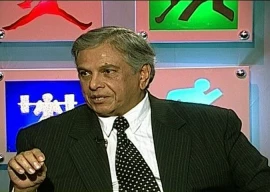
However, there is more, actually, a lot more. He was merely talking about the levies and charges collected by the petroleum ministry. All major taxes collected by the Federal Board of Revenue (FBR) are also levied on petroleum products. Our analysis here relates to 2010-11, which is the last complete fiscal year in terms of data availability. First, the FBR collects General Sales Tax (GST) on the domestic side. The collection on petroleum products in 2010-11 was Rs153.3 billion or 47.2 per cent of the total collection. This was the biggest GST spinner on domestic goods and services. Secondly, GST on the import of petroleum products is also a major contributor on the import side. Twenty-seven petroleum products yielded an amount of Rs110.5 billion in revenue, or 36 per cent of the total GST on imports. Thirdly, tariff reform of the past two decades, aimed to reduce the role of customs duties and increase the role of GST. In the case of petroleum products, however, the customs duty continues to be important, in addition to the GST on its imports. In 2010-11, import duty on petroleum products stood at Rs21.4 billion. With a share of 11.1 per cent in total customs receipts, it was the second largest item on the list of dutiable imports. Fourthly, the federal excise duty is levied on petroleum and natural gas. Its yield from petroleum was Rs5.1 billion, while natural gas contributed Rs11.6 billion. Together, the contribution total federal excise duty was 12.2 per cent, making it the third largest component in the total collection of federal excise duty. Finally, on top of the indirect taxes listed so far, the withholding income tax is the largest component of direct taxes. Separate information on its collection from the petroleum sector was not available.
There are thus nine taxes on petroleum products. Without the withholding taxes, their collection totalled Rs503.5 billion in 2010-11. This means that about half of the indirect tax revenue of the country comes from petroleum products. Is this too high? Taxes in petroleum products in other countries have also risen substantially. The objective is to contain demand in view of the rising prices. Is it morally wrong? Not quite, as these taxes have been instrumental in achieving environmental and conservation objectives. In the case of Pakistan, however, the heavy dependence on petroleum taxes is mainly due to the failure to raise direct taxes. What is worse is that, demand in the past five to six years has been at around six per cent per annum — above GDP growth, despite high prices.
Published in The Express Tribune, February 10th, 2012.
COMMENTS (11)
Comments are moderated and generally will be posted if they are on-topic and not abusive.
For more information, please see our Comments FAQ





























1714024018-0/ModiLara-(1)1714024018-0-270x192.webp)









Some body should compile figures in tabulated format and inform public regularly on it and like issues. Petroleum consumption in Pakistan is on bare necessities as no alternative transports, alternative fuel like coal available.
Direct tax net doesn't cover big landlords who have huge agricultural income. Politicians don't pay taxes in reflection of their life style. Big business and industry go in liaison with bureaucracy to avoid taxes. Huge leakages in power and gas sector is hollow cry. Corruption rules the country. Middle income populace is the only section paying direct taxes.
@ Interconnect Partners: If past is any guide to local auto production efforts, you need a lot of prayers and good wishes. Best of luck.
Its not the job of the government to tax people to death just because they want to discourage a certain activity based on flimsy excuses. Yousaf is right, suppose the government decides that people should drink more milk and eat less meat...does it make it ok to place a 400% tax on meat and providing a 99% subsidy on milk? Energy plays such a critical role in everybody's lives and the government fails to provide it and taxes to death the only methods available to the public to generate their own. It is criminal how oppressive this tax/spending regime is for the ordinary public. The cheaper that energy becomes for the public, the higher the level of productivity..everything from the cost of food to the cost of health care is affected by it.....raising the cost of energy is genocidally stupid. I would think that any educated and thinking person could see that
@Dr.Pervez Tahir:--As for conservation objective,same excuse was given when the sale of meat was curtailed to five days a week.As a result a butcher who sold five goats a day prior to the restriction now sells fifty goats per day and consumers have to pay over Rs.600.00 per Kg while the butcher has two days off(lucky?).Conservation policy has made meat-animals so scarce that on Eid occasion an average 15 Kg goat costs Rs,20,000 or more.Sir you are lucky you left here in time for Cambridge and now can talk of billions as if they were (Moong-Phalies).I made the mistake of staying back and now after tirelessly working for 40 years and having paid all due direct/indirect taxes have to purchase(taxed)medicines for my old age ailments(Gods excuses to call a person back)
Over Tax petroleum products so that amnesty (NRO) is granted to investment in stock exchange.
Thank God I am not an economist
I'm working on the development of Electric Vehicles EV and networked car for which trails are being held at Europe. Commercial products are built now in US, Europe, China, Japan. This car will be with no fuel. Since this is non polluting car it carries a special slot of subsidy by Governments worldwide in US, Japan, Europe, etc., almost zero duty. I have plans for assembly of these cars, which will be charged by electric socket, in an hour time, will give an approx runs of 100 kms. The matter of HVAC (aircon) for Pakistan is also under works by utilising PV solar on the car roof to keep the car at comfortable temperature with a small aircon., and air circulation with fan. Will the conventional hierarchy of automobile industry tolerate this for zero fuel cost, zero tax, low priced car to be developed and made in Pakistan for the betterment of our people.
Or will we still be trailing with fuel guzzling monsters power trains on the streets with pollution, inviting Tsunamis for our generations for hazards.
How does Direct Tax Help Me in my Retirement. Where is my Return after Sixty. Am I Not a Stakeholder in Pakistan. I am a Citizen of Pakistan, Why Benefit purposely Denied. What is My Return Paying Tax's' in Pakistan. Why do many Pakistani do Not file Tax Return? What is my Return in my Retirement.
@ Wilayat Malik
Your analysis is true for top 1 or 2 percent of our population. Wat about the corporate professionals like me who pay income tax (flood surcharge as well, even though i didnt make the flood come to rural areas...its a personal opinion though) and yet suffer exobitant tax rate on everything. We dont have ample agricultural land to increase our yield in order to tame inflation. Ours is a fixed income but expenses are becoming variable everyday
PT,
I am sure petroleum is "over-taxed" around the world (except the US!). It is easy to collect and the scope for 'leakage' is small. a real money-spinner.
Of course, it goes without saying, that we should rely more on progressive forms of taxation.
Tell that to our "awam dost" dashing about in their SUV's.
The biggest user of Petroleum products are the automobiles. Those who own cars can afford to pay these taxes. Since most of them don't pay income tax, this is the only way government can collect tax revenues. Transporters can always raise small amount of their fairs to compensate for extra tax paid at the pump. It is a fair game.
Agree with you. Imposing high taxes on petroleum for an export based economy just to balance lost revenues from other sides is not a healthy practice. It just kicks the can down the road to SMEs who have to compensate for this through low operational costs and shrinking profit margins. There is a reason China and India are making significant efforts to have access to cheap commodity inputs. We are losing significant labor arbitrage opportunity because of high energy, commodity, and security costs.